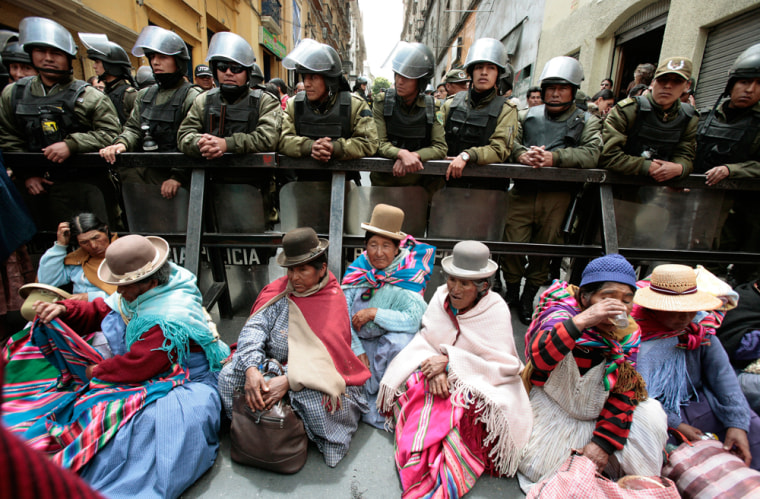President Evo Morales announced Tuesday that soldiers have arrested an opposition governor on suspicion of directing a massacre of the leftist leader's supporters as Bolivia's political crisis continued to unfold.
The political unrest — and the expulsion of the U.S. ambassador — prompted the United States to suspend the Peace Corps program in Bolivia, evacuating its estimated 130 volunteers to neighboring Peru.
The U.S. government advised Americans to leave the country. In Washington, the State Department announced it would offer one or two flights out of Bolivia Wednesday for American citizens living there.
American Airlines temporarily suspended commercial flights between Miami and Bolivia because of the political unrest.
President Bush on Tuesday also placed Bolivia on a counter-narcotics blacklist, saying that country is no longer cooperating in the war against drugs.
Bolivia, a major cocaine producer, joins Venezuela and Myanmar on a list of nations that the U.S. says have "failed demonstrably" to meet their international commitments to combatting the production and trafficking of illicit drugs.
Countries thus designated can be hit with substantial cuts in U.S. assistance, although Bush chose to waive those penalties for both Venezuela and Bolivia.
Violent demostrations
Morales said soldiers dispatched to the northern province of Pando have detained Gov. Leopoldo Fernandez on charges of "genocide" allegedly organizing an armed ambush of pro-Morales demonstrators last week that left at least 15 dead and 37 injured.
"I hope ... that I never feel unaccompanied by Bolivian justice," said Morales, defending the arrest as a "legal and constitutional" action by troops holding Pando under martial law.
Anti-Morales protesters in Pando and three other eastern provinces seized national government buildings last week to block a vote on his proposed new constitution, which would allow Morales to run for re-election while granting greater power to Bolivia's poor indigenous majority.
Last week, Morales declared U.S. ambassador Philip Goldberg persona non grata, triggering an evacuation of all non-emergency personnel from the American Embassy in La Paz. The Peace Corps pullout was accomplished over the weekend and announced on Tuesday.
"Our first priority is the safety and security of our volunteers," said Peace Corps Director Ron Tschetter in a statement.
Since 1962, more than 2,500 Peace Corps Volunteers have served in Bolivia. The current volunteers — who worked in agriculture, business development, environment, health, and youth development — will be given a choice between continuing their service in another country, or returning home, he said.
